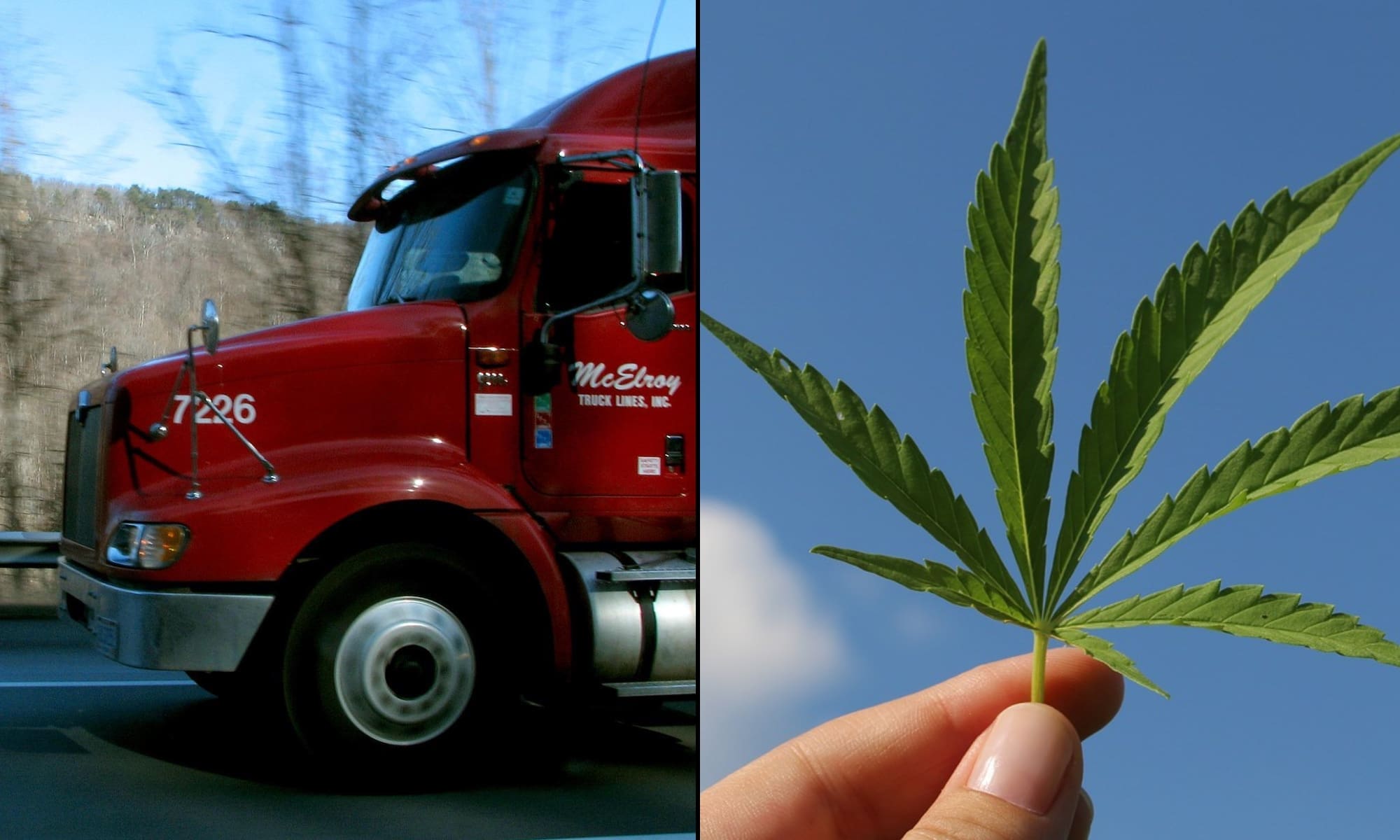Politics
Truckers Support Marijuana Rescheduling, But Industry Group Warns Of ‘Significant Negative Consequences’

The country’s leading trucking trade group is warning that rescheduling marijuana could lead to “significant negative consequences” for both the industry and other motorists on the road. But many individual truck drivers disagree, with some having filed comments with federal officials in support of the rescheduling move.
The American Trucking Associations (ATA) said in a letter to U.S. Transportation Secretary Pete Buttigieg that while it doesn’t have a formal position on cannabis legalization, “we remain concerned about the broad public health and safety consequences of reclassification on the national highway system and its users.”
The group is requesting that the Department of Transportation (DOT) maintain the ability of employers to conduct drug testing of marijuana use by commercial drivers and other safety-sensitive transportation workers.
“It is critical for transportation safety that we maintain the scope and scrutiny of testing that currently exists for individuals engaged in safety-sensitive industries,” wrote Dan Horvath, ATA’s senior vice president of regulatory affairs and safety policy. “Given the seemingly inevitable increase in marijuana-impaired driving following a federal rescheduling, ATA is committed to working with DOT and other stakeholders to prevent marijuana-related crashes and fatalities.”
In relevant part, ATA says it intends to engage the Department of Justice (DOJ), the Department of Health and Human Services (HHS) “and other federal partners to ensure that any change in the law regarding the status and legality of marijuana use is accompanied by an explicit allowance for the testing of marijuana use by DOT-regulated safety-sensitive workers.”
The letter is “part of an ongoing effort to raise the alarm” about the proposal to move marijuana from Schedule I to Schedule III of the Controlled Substances Act (CSA), ATA said in a press release. “This major policy shift could have significant negative consequences for highway safety, endangering all who share the road.”
But while the trucking industry is raising the alarm, truckers themselves apparently feel differently about the proposed policy shift. As part of an ongoing public comment period around rescheduling, some commercial drivers have weighed in to defend rescheduling.
As first reported by the industry outlet Freight Waves, the comments from truckers “overwhelmingly—and anonymously—favor reclassification.”
Many underscored the restrictions on consuming marijuana compared to partaking in alcohol.
One trucker submitted a comment that says, “We can go have drinks after we get done from a long day (partaking in something that is known to cause death and serious injuries when incoherent) but we can’t smoke something that has medical benefits, something that will help truckers sleep better at night, deal with pain from being behind the wheel and [from] basic physical activity from the job, and deal with stress anxiety of the job and being away from home.”
“As a truck driver in the United States I would like to be able to use marijuana on my time off,” wrote another. “I believe it is unfair that I can lose my job and my license if I have used marijuana and a month later I can still lose my job if I come out ‘dirty’ in a random drug test. The statistics are there and proven that alcohol is the leading cause of death in car accidents compared to nearly zero percent with marijuana.”
ATA, for its part, said in its letter to Buttigieg that “marijuana and alcohol remain the most detected drugs in impaired driving crashes resulting in serious or fatal injuries,” although it does not attempt to compare the relative harms caused by the two substances. The group asserted, however, that “marijuana continues to lead as the drug most frequently used by drivers.”
Another trucker, who also claimed to be a driving instructor, pushed back on the notion that the regulatory change would signal to drivers that it’s OK to consume before a shift.
“I would expect my drivers to not drink alcohol at work, take NyQuil before a shift or a prescription that would interfere with driving, or get behind the wheel with lack of sleep,” the commenter wrote, “and the same would apply to those who take cannabis.”
As more states legalize marijuana, a federal report published earlier this year showed that the number of positive drug tests among commercial drivers fell in 2023 compared to the year before, dropping from 57,597 in 2022 to 54,464 in last year. At the same time, however, the number of drivers who refused to be screened at all also increased by 39 percent.
Another question found that 65.4 percent of motor carriers believed current marijuana testing procedures should be replaced with methods that measure active impairment.
At the time, the report from the American Transportation Research Institute (ATRI) noted a 65,000-driver deficit in the country and said the fear of positives over marijuana metabolites—which can remain in a person’s blood far long after active impairment—may be keeping would-be drivers out of the industry.
The record-high number of refusals came as the transportation industry faces a nationwide shortage of drivers, which some trade groups have said has only been made worse by drug testing policies that risk flagging drivers even when they’re not impaired on the job.
Current federal law mandates that commercial drivers abstain from cannabis, subjecting them to various forms of drug screening, from pre-employment to randomized testing.
In June of last year, meanwhile, a American Transportation Research Institute (ATRI) survey of licensed U.S. truck drivers found that 72.4 percent supported “loosening” cannabis laws and testing policies. Another 66.5 percent said that marijuana should be federally legalized.
Cannabis reform advocates, meanwhile, have also called on federal officials to change what they call “discriminatory” drug testing practices around the trucking industry.
“Tens of thousands of workers are leaving the commercial trucking industry because the federal government refuses to update its antiquated marijuana policies,” Paul Armentano, deputy director of NORML, wrote in a Marijuana Moment op-ed earlier this year. “Fewer truckers on the road results in supply chain shortages and higher prices for the goods Americans rely on.”
A top Wells Fargo analyst said in 2022 that there’s one main reason for rising costs and worker shortages in the transportation sector: federal marijuana criminalization and resulting drug testing mandates that persist even as more states enact legalization.
Rep. Earl Blumenauer (D-OR) sent a letter to the head of DOT in 2022, emphasizing that the agency’s policies on drug testing truckers and other commercial drivers for marijuana are unnecessarily costing people their jobs and contributing to supply chain issues.
Last year’s ATRI report noted that research into the impact of cannabis use on driving and highway safety is currently mixed, complicating rulemaking to address the issue. A separate 2019 report from the Congressional Research Service (CRS) similarly found that evidence about cannabis’s ability to impair driving is inconclusive.
Also last year, DOT finalized a rule permitting another alternative option to screening urine samples: saliva-based testing. Depending on frequency of use, THC is generally detectable in saliva anywhere from one to 24 hours after use, according to the agency.
In 2022, meanwhile, DOT proposed guidance warning commercial drivers who use CBD products that they are doing so “at their own risk.”
A newsletter from DOT’s Federal Transit Administration (FTA) published that same year included two sections on cannabis issues: one that again reminded employees that they’re barred from using marijuana and another that similarly warned that CBD products remain unregulated and could contain THC levels that are detectable in a drug test.
Meanwhile the head of ATA told Congress a year ago that the state–federal marijuana policy conflict is creating a “litigious environment” for the trucking industry, contributing to the challenge of the labor shortage.
“Want to smoke weed at home? Smoke weed at home. If it’s legal, fine,” ATA President Chris Spear said at the time. “Do not get behind the wheel of an 80,000-pound vehicle. We need to have strong standards, and we need to enforce the law.”
















